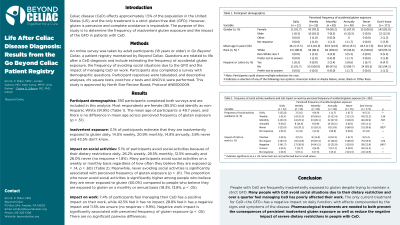Monday Poster Session
Category: Small Intestine
P3194 - Life After Celiac Disease Diagnosis: Results from the Go Beyond Celiac Patient Registry
Monday, October 28, 2024
10:30 AM - 4:00 PM ET
Location: Exhibit Hall E

Has Audio

Debra G. Silberg, MD, PhD, FACG
Beyond Celiac
Ambler, MD
Presenting Author(s)
Erin B. P.. Miller, MPH, Jordan Dubow, MD, Kate Avery, MPH, Amy Ratner, BA, Debra G.. Silberg, MD, PhD, FACG
Beyond Celiac, Ambler, PA
Introduction: Celiac disease (CeD) affects approximately 1.5% of the population in the United States (US), and the only treatment is a strict gluten-free diet (GFD). However, gluten is pervasive and complete avoidance is impossible. The purpose of this study is to determine the frequency of inadvertent gluten exposure and the impact of the GFD in patients with CeD.
Methods: An online survey was taken by adult participants (≥ 18) in the Go Beyond Celiac patient registry, maintained by a US-based patient advocacy organization. Questions are related to life after a CeD diagnosis and include estimating the frequency of accidental gluten exposure, the frequency of avoiding social situations due to the GFD, and the impact of managing CeD on work. Participant responses were tabulated and descriptive analyses and chi square tests were performed. This study is approved by North Star Review Board, Protocol #NB100009.
Results: 393 participants completed the survey and are included in this analysis. 3.1% of participants estimate that they are inadvertently exposed to gluten daily, 14.0% weekly, 20.9% monthly, 14.8% annually, 3.8% never, and 43.5% don't know. 5.1% of participants avoid social activities because of their dietary restrictions daily, 26.2% weekly, 28.5% monthly, 12.5% annually, and 26.0% never (no response = 1.8%). Avoiding social activities daily (p < .05) and never (p < .01) are each significantly associated with gluten exposure frequency. Notably, many participants avoid social activities on a weekly or monthly basis regardless of how often they believe they are exposed. 7.4% of participants feel managing their CeD has a positive impact on their work, while 42.5% feel it has no impact, 28.8% feel it has a negative impact, and 11.5% are unsure (no response = 9.9%). Negative work impact is significantly associated with frequency of gluten exposure (p < .05).
Discussion: People with CeD are frequently inadvertently exposed to gluten despite trying to maintain a strict GFD. Many people with CeD avoid social situations due to their dietary restriction and over a quarter feel managing CeD has poorly affected their work. The only current treatment for CeD—the GFD—has a negative impact on daily function, with effects compounded by the signs and symptoms of the disease. Pharmacological treatments are needed to both prevent the consequences of persistent inadvertent gluten exposure as well as reduce the negative impact of severe dietary restrictions in people with CeD.
Disclosures:
Erin B. P.. Miller, MPH, Jordan Dubow, MD, Kate Avery, MPH, Amy Ratner, BA, Debra G.. Silberg, MD, PhD, FACG. P3194 - Life After Celiac Disease Diagnosis: Results from the Go Beyond Celiac Patient Registry, ACG 2024 Annual Scientific Meeting Abstracts. Philadelphia, PA: American College of Gastroenterology.
Beyond Celiac, Ambler, PA
Introduction: Celiac disease (CeD) affects approximately 1.5% of the population in the United States (US), and the only treatment is a strict gluten-free diet (GFD). However, gluten is pervasive and complete avoidance is impossible. The purpose of this study is to determine the frequency of inadvertent gluten exposure and the impact of the GFD in patients with CeD.
Methods: An online survey was taken by adult participants (≥ 18) in the Go Beyond Celiac patient registry, maintained by a US-based patient advocacy organization. Questions are related to life after a CeD diagnosis and include estimating the frequency of accidental gluten exposure, the frequency of avoiding social situations due to the GFD, and the impact of managing CeD on work. Participant responses were tabulated and descriptive analyses and chi square tests were performed. This study is approved by North Star Review Board, Protocol #NB100009.
Results: 393 participants completed the survey and are included in this analysis. 3.1% of participants estimate that they are inadvertently exposed to gluten daily, 14.0% weekly, 20.9% monthly, 14.8% annually, 3.8% never, and 43.5% don't know. 5.1% of participants avoid social activities because of their dietary restrictions daily, 26.2% weekly, 28.5% monthly, 12.5% annually, and 26.0% never (no response = 1.8%). Avoiding social activities daily (p < .05) and never (p < .01) are each significantly associated with gluten exposure frequency. Notably, many participants avoid social activities on a weekly or monthly basis regardless of how often they believe they are exposed. 7.4% of participants feel managing their CeD has a positive impact on their work, while 42.5% feel it has no impact, 28.8% feel it has a negative impact, and 11.5% are unsure (no response = 9.9%). Negative work impact is significantly associated with frequency of gluten exposure (p < .05).
Discussion: People with CeD are frequently inadvertently exposed to gluten despite trying to maintain a strict GFD. Many people with CeD avoid social situations due to their dietary restriction and over a quarter feel managing CeD has poorly affected their work. The only current treatment for CeD—the GFD—has a negative impact on daily function, with effects compounded by the signs and symptoms of the disease. Pharmacological treatments are needed to both prevent the consequences of persistent inadvertent gluten exposure as well as reduce the negative impact of severe dietary restrictions in people with CeD.
Disclosures:
Erin Miller indicated no relevant financial relationships.
Jordan Dubow: Apertura Gene Therapy – Consultant. Avadel Pharmaeuticals – Consultant. Jocasta Neuroscience – Consultant. Paragon Biosciences – Consultant. Revalesio – Consultant. Satellos Biosciences – Consultant.
Kate Avery indicated no relevant financial relationships.
Amy Ratner indicated no relevant financial relationships.
Debra Silberg: Anokion – Advisor or Review Panel Member. Ellodi – Advisory Committee/Board Member. Intercept – Advisor or Review Panel Member. InveniAI – Consultant. Neurogastrx – Consultant.
Erin B. P.. Miller, MPH, Jordan Dubow, MD, Kate Avery, MPH, Amy Ratner, BA, Debra G.. Silberg, MD, PhD, FACG. P3194 - Life After Celiac Disease Diagnosis: Results from the Go Beyond Celiac Patient Registry, ACG 2024 Annual Scientific Meeting Abstracts. Philadelphia, PA: American College of Gastroenterology.
